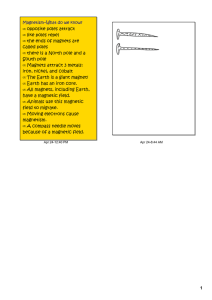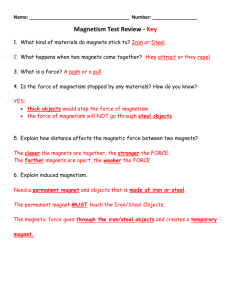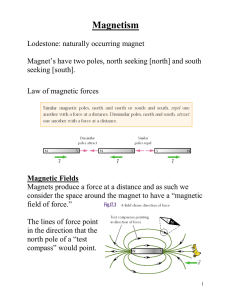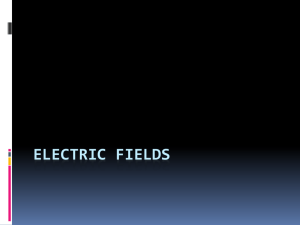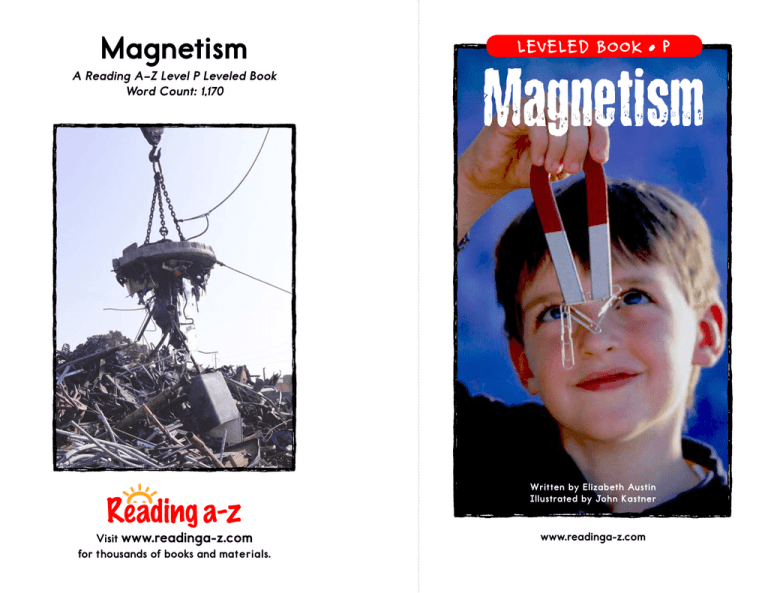
Magnetism
A Reading A–Z Level P Leveled Book
Word Count: 1,170
LEVELED BOOK • P
Magnetism
Written by Elizabeth Austin
Illustrated by John Kastner
Visit www.readinga-z.com
for thousands of books and materials.
www.readinga-z.com
Photo Credits:
Front cover, page 20: © Erin Hogan/Photodisc/Getty Images; back cover, pages
3, 4 (top left), 4 (bottom center), 4 (bottom right), 11, 14,16: © PhotoSpin; title page,
page 6: © Jovani Carlo Gorospe/123RF; pages 4 (top center), 17: © Amos Morgan/
Photodisc/Getty Images; page 4 (top right): © Ryan McVay/Photodisc/Getty
Images; page 4 (bottom left): © Photodisc; page 5: © Steve Cole/Photodisc/Getty
Images; page 7: Courtesy of NASA/JPL; page 9: © Arthur S. Aubry/PhotoDisc/
Getty Images; page 10: © Learning A-Z; page 13: © Richard Gross/Corbis; page
19: © Draguta/Dreamstime.com
Magnetism
Written by Elizabeth Austin
Illustrated by John Kastner
Magnetism
Level P Leveled Book
© Learning A–Z
Written by Elizabeth Austin
Illustrated by John Kastner
All rights reserved.
www.readinga-z.com
www.readinga-z.com
Correlation
LEVEL P
Fountas & Pinnell
Reading Recovery
DRA
M
28
28
Introduction
Table of Contents
Introduction . . . . . . . . . . . . . . . . . . . . . . . 4
Magnetism and Magnets . . . . . . . . . . . . . 5
Magnetic Field . . . . . . . . . . . . . . . . . . . . . 8
How Are Magnets Made? . . . . . . . . . . . 10
Try This . . . . . . . . . . . . . . . . . . . . . . . . . . 12
Magnetism and Electricity . . . . . . . . . . 13
Using Magnetism . . . . . . . . . . . . . . . . . . 16
Conclusion . . . . . . . . . . . . . . . . . . . . . . . 20
Glossary . . . . . . . . . . . . . . . . . . . . . . . . . . 21
Magnetism • Level P
3
Look around your home and try to find
a magnet. A magnet is a metal object
that sticks to other metals. You might
have some magnets among your toys.
There are probably magnets on your
refrigerator. But did you know that there
may be hundreds of magnets in your
home? You cannot see most of them. But
they are inside your television, telephone,
and stereo. They are inside electric
motors that power your blender and hair
dryer. Computers are full of magnets.
And all the electricity that runs these
things comes from magnetism.
4
Magnetism and Magnets
Magnetism is an invisible force. A
force is anything that pushes, pulls, or
moves an object. Magnetism is a special
force that only pulls on some metals,
such as iron. A magnet will not push
or pull plastic or tin.
Magnetism flows in one direction through
a magnet, no matter what shape the
magnet is. It flows in one end and out
the other. The ends of a magnet are called
magnetic poles.
Every magnet
has a north and
a south pole. The
force flows out
the north pole
and back in the
south pole.
Magnetism • Level P
5
You can use two
magnets to feel
magnetism flowing.
The north pole of one magnet will stick
to the south pole of the other. Now, try
to push the two north poles together.
It feels almost like trying to connect
two hoses that are both spraying water.
The magnetic force pushes the north
poles apart, because the magnetic forces
are flowing against each other. Two north
poles will always repel each other. So
will two south poles.
6
The Earth’s iron core is magnetic.
The whole planet acts like a giant
magnet. If you dangle a magnet by a
string, one pole will point north and the
other will point south. This is exactly
how a
compass
works. This
gave the
north and
south poles
of a magnet
their names.
Magnetic Field
Do You Know?
Earth’s north and south magnetic poles are
not quite at the true North and South Poles. The
north magnetic pole is in northern Canada. The
south magnetic pole is in the Pacific Ocean south
of Australia. Since Earth’s core moves around,
the magnetic poles move, too. They can even flip
completely around. If this happened today, your
compass needle would point south!
Magnetism • Level P
The magnetic force flows out the north
pole of the magnet. Then, it loops
around outside the magnet and flows
back in the south pole. Magnetism flows
through space in lines of force. The
invisible shape formed by the lines of
force around the magnet is called the
magnetic field.
7
8
Any iron or other magnets inside a
magnetic field will be pulled toward the
magnet. Stronger magnets have more
lines of force and larger magnetic fields.
To see a magnetic field, place a magnet
on a piece of paper. Sprinkle iron filings
around the magnet. The filings will
gather along the lines of force in the
shape of the magnetic field.
Magnetism • Level P
9
How Are Magnets Made?
The first magnets were made of a natural
rock called lodestone. People used pieces
of lodestone in compasses. But they did
not know how they worked.
Every material is made
of extremely tiny
pieces called
atoms. Most
atoms spin. This
spinning creates
a tiny, tiny force. In
most things, like rocks
or plastic, the atoms
spin every which way.
The tiny forces never add up. But when
something becomes magnetized, the
atoms spin in the same direction. All the
tiny forces add up to create a magnetic
force. Eventually, people learned how
to line up the atoms in some metals to
create new magnets.
10
Some things, such as iron, become
magnetized more easily than others.
A piece of ordinary iron is placed inside
a strong magnetic field. The magnetic
force makes the iron atoms line up and
spin in the same direction. This makes
a new magnet. The more atoms that spin
in the same direction, the stronger the
magnet becomes. Sometimes if you
drop a magnet, some of the atoms get
knocked out of line, and the magnet
gets weaker.
Magnetism • Level P
11
his
T
y
Tr Make your own magnet!
You will need a large iron nail,
a strong magnet, and several paper clips.
1 Hold the nail by one end and slide it across
the magnet in one direction. Keep sliding it
over and over. The magnet’s lines of force
will start to line up the atoms in the nail.
2 After 20 to 30 times, touch the nail to the
paper clips. Does the nail pick up the clips?
How many can it pick up at once? Keep
stroking the nail along the magnet to make
the nail’s magnetic force stronger. See if you
can pick up all the paper clips at once.
12
electric current
turning magnet
wire
coil
Generator
All the electricity you use comes from
machines called generators. Generators
make electricity by spinning magnets
around coils of wire. The magnetism
creates an electric current in the wire.
The difficult part is getting the magnets
spinning. Power plants use running
water, wind, or steam from burning fuel
to turn the magnets.
Magnetism and Electricity
Magnetism and electricity are very
closely related. Magnets can make
electricity. And electricity creates
magnetic fields. This is because both
magnetism and electricity affect the
way atoms spin.
Magnetism • Level P
13
14
Electricity can create special magnets
called electromagnets. A wire is
wrapped around a regular piece of iron.
Then an electric current from a battery
or outlet flows through the wire. The
electric current makes a magnetic field.
This magnetizes the iron. But the iron
only stays magnetized as long as the
electricity is on.
iron bar
Using Magnetism
The earliest use of magnetism was
the compass. A small, freely moving
magnetic needle pointed to Earth’s
magnetic north pole. This helped guide
travelers and explorers. Modern travelers
still use compasses.
electric current
wire coil
Electricity comes from spinning magnets
inside generators. And electric motors
work like generators in reverse. They
use electric current to spin magnets. The
magnets are attached to fans, cutting
blades, or wheels. This is how fans,
blenders, and remote-control cars work.
Electromagnet
Magnetism • Level P
15
16
Magnets can also encode information,
or store it in a special code. Cassette
tapes, videotapes, computer disks, and
credit cards all use strips of tiny magnets.
The magnets are the size of grains
of powder. There can be millions of
magnets on one tape, disk, or credit
card. Each tiny magnet points in its own
direction. The different positions of the
magnets create a code. Tape players,
VCRs, and computers sense the tiny
magnetic fields and read the code.
Putting a credit card, tape, or disk near
a powerful magnet can mess up or erase
the code.
Magnetism • Level P
17
Some high-speed trains run on
electromagnets. The trains have powerful
electromagnets on the bottom. The track
also has powerful electromagnets. The
two electromagnets face each other so
that they repel each other. The magnetic
force is so strong that it lifts the train
off the track. The train floats above the
track. It actually flies as it travels. This
makes a fast, smooth ride.
18
Special machines called MRIs can look
inside a person’s body. The person lies
inside a tube cut right down the center
of a very powerful magnet. The lines
of force flow through the person’s body.
The magnetism is so strong that it causes
the atoms in the body to spin in the same
direction. Special sensitive instruments
can tell how fast the atoms spin.
Computers figure out what kind of
atoms they are based on how they spin.
This gives doctors an idea of what is
going on inside a person’s body.
While magnets may seem simple,
there is no end to their uses. Every
time you watch a tape, turn on the air
conditioner, or even turn on a light,
you are using magnets. Someday you
may ride on a high-speed train or use
an MRI. Playing with magnets can be
lots of fun. The magnetism you play with
is the same force that has made modern
life possible.
Doctors can find atoms that are not
supposed to be there. They can see
cancer and other
diseases. MRIs
give doctors a
look inside the
body without
having to cut the
body open.
Magnetism • Level P
Conclusion
19
20
Glossary
t he smallest parts of an
element(p. 10)
lodestone
aturally magnetic rock
n
(p. 10)
electro-
temporary magnets
magnets made by passing an
electric current through
a wire wrapped around
a piece of iron (p. 15)
magnetic
a ble to attract certain
metals, such as iron (p. 7)
atoms
encode
magnetic
invisible shape of the
field lines of force around
a magnet (p. 8)
t o put information in a
special code (p. 17)
forcethe strength or energy
that moves objects (p. 5)
generators
achines that create
m
electricity in coils of wire
using spinning magnets
(p. 14)
lines of force i nvisible lines of magnetic
force that flow through
and around a magnet (p. 8)
Magnetism • Level P
21
magnetic
the ends of a magnet
poles where the magnetic force
flows in and out (p. 5)
magnetisma force that pushes and
pulls certain metals (p. 4)
motors
achines that turn
m
electricity into motion
using coils of wire to spin
magnets (p. 16)
repel
force away (p. 6)
22

